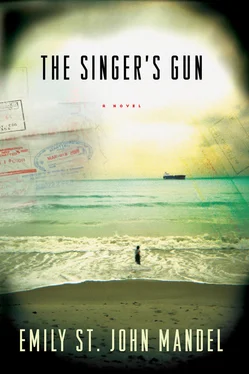“What’s the weather like there?” He was watching the fishermen preparing their nets, the first few boats gliding out around the breakwaters. He had taken to going to bed early, for lack of anything else to do in the evenings, and rising at dawn to watch the sunrise and the boats.
“Warm,” she said. “Hot, actually. It’s as if it’s still summer.”
“Have you found work?”
“I haven’t tried. I’ve just been posing naked for people.”
“People?”
“Art classes. Borderline pornographers.”
“Does that kind of thing pay well?” His tone was studiedly neutral.
“Not particularly. No. I think I have to do something else soon, or else commit to it completely.” It was impossible to keep her voice from wavering.
“What do you mean, commit to it?”
“I mean actual pornography, not just the borderline stuff.” She was looking at her reflection in the kitchen window and thinking that she looked like a ghost; in the window she was transparent against the fire-escape railings outside. “I don’t know what to do,” she said.
“What kind of job do you want?”
“That’s exactly the problem. The thought of finding another job. .” She was breathing somewhat quickly; she closed her eyes, concentrating on the idea of five-thousand-year-old pine trees, the first cup of tea and the first line of Gilgamesh , the first sheet of glass ever held up to the light, and forced the wavering part of herself to be still. She laughed in what was meant to be a carefree manner, but it was a strange clenched sound that escaped her throat.
“Elena,” he said, “it’s all going to be all right. I’ll call you tomorrow or the next day, and we’ll figure out what to do. Listen, Sophie has therapy on Thursdays. She’s always gone between five and seven.”
“I’ll go back again.”
“Thank you,” he said. “I can’t tell you how I appreciate it.”
Caleb was awake when she came back to bed.
“I’m sorry,” he said gently, when she reached out to him. It had been months now, a growing distance, like the gradual tec-tonic division of continents.
“Yes, I’m sorry too.” She hadn’t meant to speak so sharply.
“What’s upsetting you really?”
“This,” she said.
Caleb was silent. It was too dark to see his face, but she knew he was staring up at the ceiling unblinking.
“It’s late,” he said. “We should go to sleep.”
Beyond the fact that Caleb couldn’t quite bring himself to touch her anymore, there seemed to be an underlying question of compatibility. He talked about specimens, types of leaves. She found herself grieving for the absolute tragedy of the lost tree in Utah. He talked about cross-sections of bark, the genetic structure of the Lotus japonicus , work that was being done on the plant genome project. Elena listened to him and found her mind wandering, wondering if that Utah geology student who felled the four-thousand-nine-hundred-year-old tree felt remorseful, what kind of person could do that, if a person capable of felling a tree to retrieve a broken tool is even capable of understanding the sheer magnitude of his crime; someone must have pointed out to him that the organism he’d killed had been alive three thousand years before Christ, but can a man who thinks so small perceive anything so enormous?
In the morning after Caleb had left for the university Elena stood in the hallway for a while, watching the movement of the goldfish, trying to think ordered thoughts. Phylum Chordata, with us and the otters and the monkeys and the sea squirts; the phylum for all of us in possession of a nerve cord. Class Actinopterygii, the domain of bright fishes. Order Cypriniformes, of carps and minnows; family Cyprinidae, genus Carassius , species auratus . Fins like orange silk in the water. Memories of childhood cartoons with orange fishes and black cats.
Two days later she stood in the photographer’s apartment on the Upper West Side, blinking in a flood of sunlight with dust motes drifting bright around her. She hadn’t been sleeping well. Her eyes were heavy. She remembered posing here five years ago, but the memory was so distant that it was almost third-person: the five-years-ago girl had insisted that the blinds be closed even though the sunlight in the room was perfect when they were open, the five-years-ago girl had taken off her clothes but lain on her stomach on the sofa and had to be gently persuaded to turn over. Elena shied away from nothing now, but the difference was more frightening than liberating; she could feel the five-years-ago shadow staring at her from the sofa while she stood in the window in full view of the neighbors across the street, naked from the waist down except for her most perilous pair of high-heeled shoes, alarmed by how little the thought of strangers seeing her in the window concerned her.
“That’s beautiful,” Leigh said. He was moving around her, taking picture after picture, the faint digital beep of the shutter sounding over and over again. “Now take off your shirt.”
She did this, and stood naked except for the shoes. She turned her face toward the camera, but she was looking at dust motes drifting through the light.
“Close your eyes,” he said, and when she closed her eyes it was harder to balance; she touched the window frame and felt the warmth of sunlight on her hand. “Can you touch yourself a little?”
She found that she could, but that was more or less when the nausea started, and an hour later she threw up in a Starbucks bathroom near the subway.
“You can dispose of my luggage as you see fit,” Sophie had actually said, a half-hour before boarding the ferry to Naples.
How does one dispose of luggage? For the first few weeks Anton kept Sophie’s suitcase in the wardrobe beside the bed, but its presence was oppressive. On a bright clear afternoon in late October he came up from the piazza and was bothered yet again by the way the wardrobe wouldn’t quite close. He lifted the suitcase onto the bed and unzipped it. He was overcome for a moment; sweet, faint, her hair, her skin. She was the kind of preternaturally organized girl who remained packed for entire vacations, extracting a set of clothes every morning and leaving everything else folded neatly, hand-washing the previous day’s clothing in the sink and hanging it up to dry on the hotel balcony overnight, re-folding it the following morning. Everything was clean. There were three pairs of pants, several shirts, a skirt, the blue linen dress she’d worn in Naples. He laid it all out on the bed like evidence. There were t-shirts, a wrinkled blouse, underwear, socks. A bra the color of daffodils, a biography of Jim Morrison; he read the first few pages and then returned his attention to the suitcase. It was empty now but for a wadded-up pair of socks, so he began methodically checking the outside pockets. In the first pocket was an Oxford Italian-English dictionary, two blank postcards from Rome, an article about nuclear ethics torn out of a newspaper, and a packet of sugar with a picture of Capri on the back. In the other pocket were two folded maps (Rome and Naples), a partially consumed bottle of water with condensation clinging to the inside, and an envelope addressed to Sophie c/o the New York Philharmonic.
The envelope been opened. Inside was a typed note on San Francisco Symphony Orchestra letterhead, dated August 15th:
Dear Ms. Berenhardt,
As per our telephone conversation of August 4th, it is with great pleasure that I acknowledge your acceptance of our invitation to join the San Francisco Symphony Orchestra for our upcoming season. As discussed, Jacob Neerman from our personnel department will contact you within the next two weeks to work out the details. We are happy to provide a stipend to offset your expenses in relocating to San Francisco this fall. Jacob will discuss the details when you speak with him.
Читать дальше





![Ричард Деминг - Whistle Past the Graveyard [= Give the Girl a Gun]](/books/412176/richard-deming-whistle-past-the-graveyard-give-t-thumb.webp)






